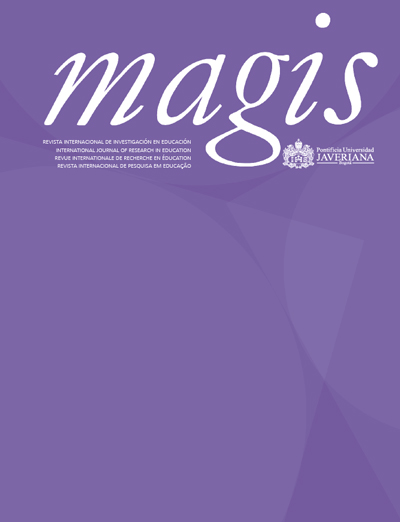Resumen
En el presente artículo de reflexión, derivado de las investigaciones del autor sobre el tema, se elabora una semblanza de Martín Lutero como educador, con ocasión de la conmemoración de los 500 años de la Reforma Protestante. En relación directa con sus escritos educativos, el autor muestra de qué forma la reforma pedagógica luterana solo es comprensible a la luz de la peculiar personalidad de Lutero, de sus tesis teológicas fundamentales y, sobre todo, de los acontecimientos que dieron lugar al movimiento reformista. Se describen el proyecto luterano de reforma de los estudios universitarios, sus ideas con respecto a la obligatoriedad de la educación elemental y los contenidos de un currículo centrado en el aprendizaje de las lenguas entendidas como “tesoros del espíritu”.
Desclée de Brouwer (2009). Biblia de Jerusalén. Nueva edición totalmente revisada Bilbao: Desclée de Brouwer.
Dilthey, Wilhelm (1968). Historia de la pedagogía. Buenos Aires: Losada.
Engels, Federico (1974). La guerra de los campesinos en Alemania. La Habana: Editorial de Ciencias Sociales.
Febvre, Lucien (1956). Martín Lutero, un destino. México: Fondo de Cultura Económica, FCE.
Kaufmann, Thomas (2017). Martín Lutero. Vida, mundo, palabra. Madrid: Trotta.
Larroyo, Francisco (1986). Historia general de la pedagogía. México: Porrúa.
Lutero, Martín (1985). La cautividad babilónica de la iglesia. La libertad del cristiano. Exhortación a la paz. Barcelona: Orbis.
Lutero, Martín (2001). Obras. Salamanca: Sígueme, Edición preparada por Teófanes Egido.
Lutero, Martín (2006). A la nobleza cristiana de la nación alemana. Disponible en: http://escriturayverdad.cl/wp-content/uploads/ObrasdeMartinLutero/15171520/1520ALANOBLEZACRISTIANADELANACIONALEMANA.pdf
Lutero, Martín (2008). Sermón para que se manden los hijos a la escuela. Disponible en: http://www.iglesiareformada.com/Lutero_MANDEN_HIJOS_ESCUELA.doc
Marx, Karl (1982). Introducción a la crítica de la filosofía del derecho de Hegel. En La Sagrada Familia y otros escritos de juventud, 2-15. México: Grijalbo.
Parra, Alberto, S. J. (1983). En torno a los principios de la hermenéutica luterana. Una perspectiva ecuménica latinoamericana. Theologica Xaveriana, 66, 35-69. Disponible en: http://theologicaxaveriana.javeriana.edu.co/descargas.php?archivo=Alberto%20parra.pdf&idArt=888&edicion=66
Pinzón-Medina, Jaime (1982). Lutero, conciencia cautiva de la Palabra. Theologica Xaveriana, 63, 95-109. Disponible en: http://theologicaxaveriana.javeriana.edu.co/edicion.php?Ed=148&Cn=
Spranger, Eduardo (1948). Cultura y educación. Buenos Aires: Espasa-Calpe, Colección Austral.
Suárez-Litvin, Roldan Tomasz (2003). El sentido histórico del proyecto educativo de Lutero (I). Frónesis, 10 (3), Caracas. Disponible en: http://www.scielo.org.ve/scielo.php?script=sci_arttext&pid=S1315-62682003000300002
La revista magis, Revista Internacional de Investigación en Educación by Pontificia Universidad Javeriana se encuentra registrada bajo la licencia Creative Commons Reconocimiento 4.0 Internacional. Por lo tanto, esta obra se puede reproducir, distribuir y comunicar públicamente en formato digital, siempre que se reconozca el nombre de los autores y a la Pontificia Universidad Javeriana. Se permite citar, adaptar, transformar, autoarchivar, republicar y crear a partir del material, para cualquier finalidad (incluso comercial), siempre que se reconozca adecuadamente la autoría, se proporcione un enlace a la obra original y se indique si se han realizado cambios. La Pontificia Universidad Javeriana no retiene los derechos sobre las obras publicadas y los contenidos son responsabilidad exclusiva de los autores, quienes conservan sus derechos morales, intelectuales, de privacidad y publicidad.
El aval sobre la intervención de la obra (revisión, corrección de estilo, traducción, diagramación) y su posterior divulgación se otorga mediante una licencia de uso y no a través de una cesión de derechos, lo que representa que la revista y la Pontificia Universidad Javeriana se eximen de cualquier responsabilidad que se pueda derivar de una mala práctica ética por parte de los autores. En consecuencia de la protección brindada por la licencia de uso, la revista no se encuentra en la obligación de publicar retractaciones o modificar la información ya publicada, a no ser que la errata surja del proceso de gestión editorial. La publicación de contenidos en esta revista no representa regalías para los contribuyentes.



